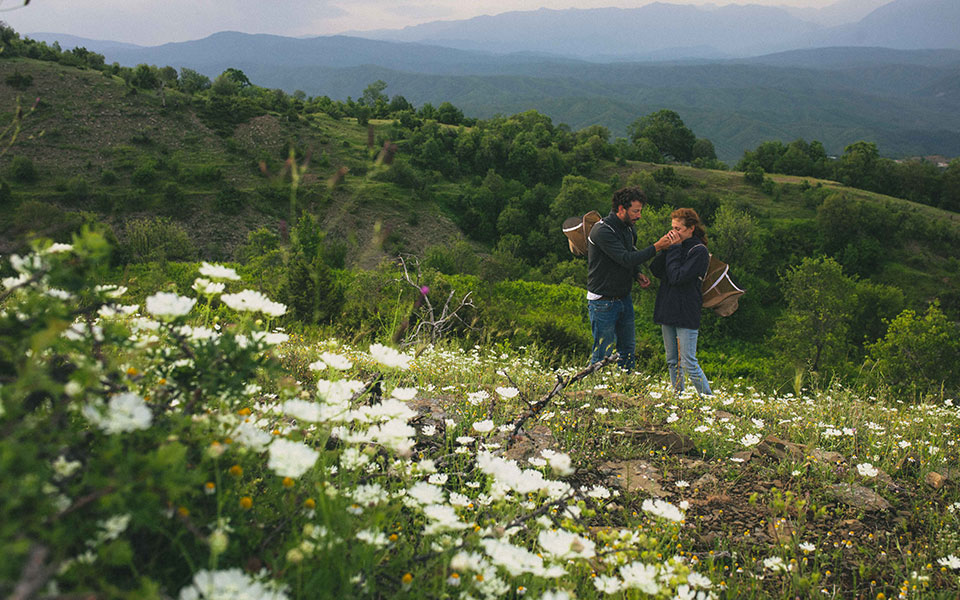We’re standing at over 1,400 metres above sea level on what feels like the top of the world. The sharp stone peaks of the Pindus mountains stretch to the horizon in every direction. For Eleni Plachoura and Vasilis Ritas, this is the office. Their beehives are just a short walk down from the ridge, in a protected clearing surrounded by tall trees and wild flowers. “Every week you’ll find different flowers in the mountains,” Eleni explains, as she points out the white salepi and wild oregano growing nearby. “Our bees feed from oak and maple trees, blue thistle, clover and cranberries, or wild rose, sage, thyme and mint.”
Epirus is one of the most isolated, storied and least developed regions in Greece. It has a magical timelessness that leaves a lasting impression on all who pass through. It’s a resource of deep cultural traditions, such as nomadic shepherding and Ipirotika, believed to be Europe’s oldest surviving folk music. To leave as little trace as possible, photographer Theo McInnes and I set out by bicycle to explore this northern Greek treasure.
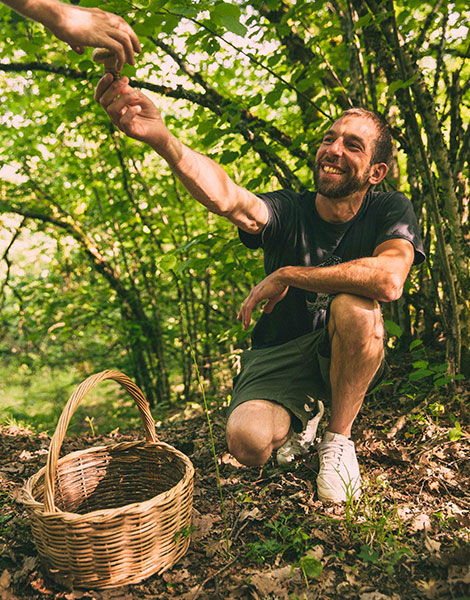
© Theo McInnes
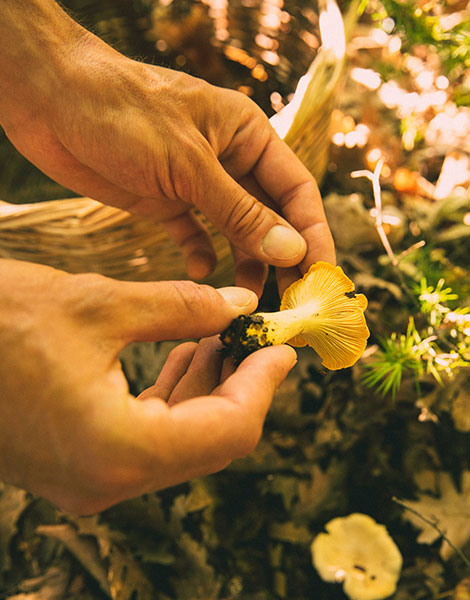
© Theo McInnes
Epirus is also the guardian of immense natural history and wealth, with much of the province protected under the EU’s Natura 2000 area scheme. In February, the Greek Ministry of Culture applied for UNESCO Cultural Landscape Status for Zagori: the mountainous area which contains the Aoos – Vikos Geopark, the Pindus National Park and a network of 46 old stone villages connected by vaulting stone bridges – the Zagorochoria.
Underdevelopment preserves the unspoilt beauty of the region but life for many local people is a struggle. Traditional ways of life are under threat as the beautiful old stone villages steadily empty of life. Oil and gas exploration has led some local people and politicians to hope drilling could bring jobs back to the area. But a new generation of artisan producers are working to reverse the decline in their own way; they’re attempting to revitalise rural life by developing new approaches grounded in the heritage of the region. They’re working to combine tourism, tradition and sustainability to create a more vibrant local economy, preserving the region’s unique biodiversity and way of life for future generations. We cycled into the mountains or Epirus to experience this new vision for ourselves.
“This isn’t a business,” Eleni explains. “It’s a way of living. We need income to live but it’s not the reason we do this. We want to make a small quantity of top quality products from our beehives. We want our kids to grow up with us here and for them to have this connection with nature.” Eleni and Vassilis spend hours on the road each day in their white Land Rover, emblazoned with the Nomad Honey logo, to tend to their collection of hives, which are all between 1,100 and 1,400 metres above sea level. Placing their beehives so high up contributes pollinators to the local ecosystem. But the clean mountain air and remarkable biodiversity also helps produce the very finest honey, packed with health benefits.
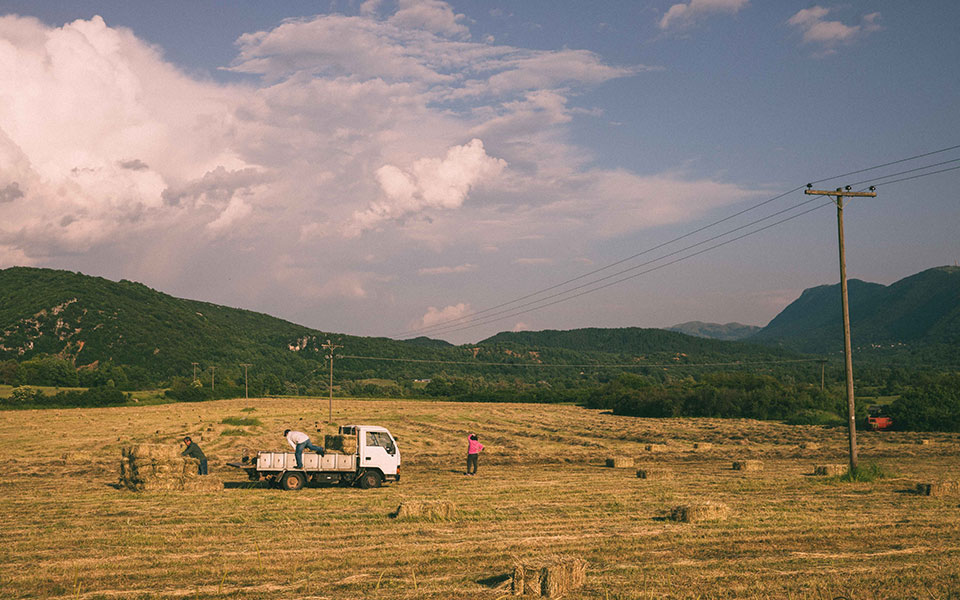
© Theo McInnes
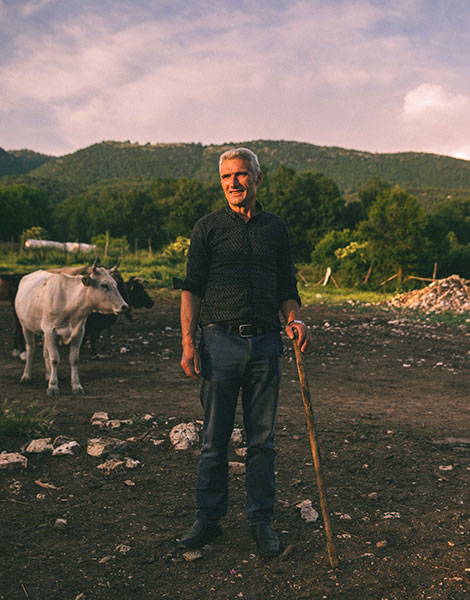
© Theo McInnes
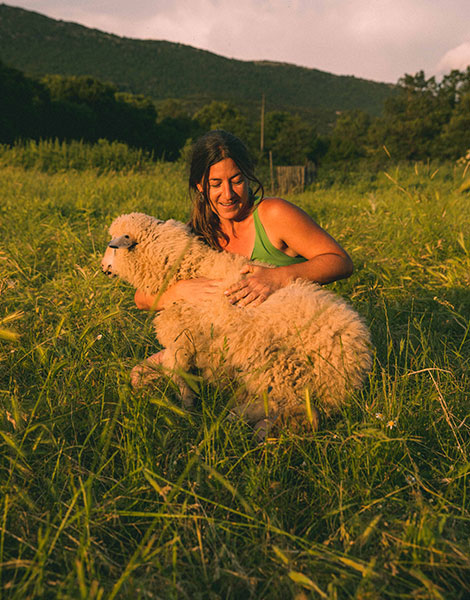
© Theo McInnes
When rainfall makes further inspection of the beehives impossible, we descend to the town square in Vradetto. Outside the village kafeneion, we sit under the shade of a giant plane tree to sample Nomad Honey’s products, accompanied by a bottle of tsipouro and handmade mezzedes.
Eleni and Vassilis worked as civil and mechanical engineers, respectively, on construction projects in Athens, Ioannina, Guildford and Patras. But they grew frustrated with corporate culture. The senior nun at Aghiou Ioanni monastery in Kastritsa near Ioannina introduced bees into their lives and their new obsession was born. In 2016, they quit their jobs to work full time on Nomad Honey. The brand has been achieved the prestigious TÜV Austria Bio certification, won awards from UK Great Taste in 2021 and exports to the US, France and Germany.
Small, family producers in Epirus still face huge challenges to survive – and Eleni and Vassilis have seen many others fail. Producing a top quality, natural product involves huge challenges and securing a fair price is never guaranteed. Time and resources are eaten up by packaging, branding, marketing, certification, bureaucracy and taxes.
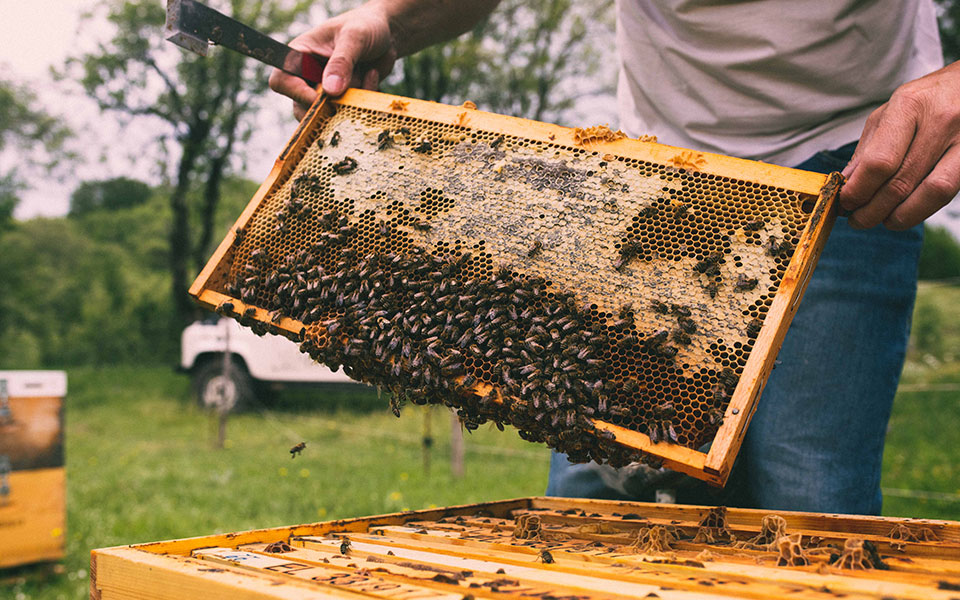
© Theo McInnes
Yet this demanding daily grind has done nothing to diminish Eleni and Vassilis’ immense passion. “When you’re a nomad you don’t own anything,” Vassilis explains. “Our bees move and we move with them. We take them to different places, we live in nature with them and eventually collect their honey. This is freedom. We own everything without owning anything.”
Back in Ioannina, on Zappa, the historic street of the ironsmiths, Folk Street Food is hosting a culinary pop-up. Jordan Tseneklidis and Panagiotis Siafakas of Nomad et Sauvage are stoking the embers on an imposing black metal open fire cooking set-up, with hanging carcasses of lamb, rooster and sea bass. Panagiotis grew up in Ioannina, while Jordan was raised in Grevena. Together, the pair travel across Greece, researching authentic Greek cuisine, particularly in its mountainous regions, and hosting outdoor feasts, foraging and open fire cooking experiences.
Today, they’ve assembled the best of Ioannina’s contemporary food scene. The meat and vegetables are sourced from an organic farm in Baltouma, a high valley on the other side of Lake Pamvotis. The biological wine is produced by local winemaker Vassilis Vaimakis and his daughter Danae. The Vaimakises also produce incredible aged balsamic vinegar, imbued with herbs and spices, inside three converted OSE wagons just outside the village of Katsikas, and have plans to develop the site into a location for wine tastings, gastrotourism and outdoor feasts.
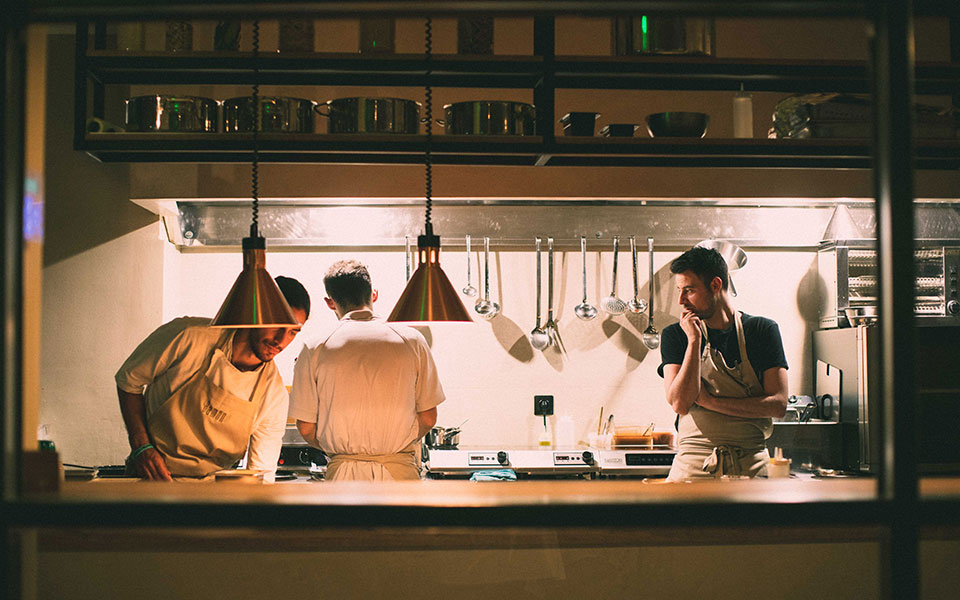
© Theo McInnes
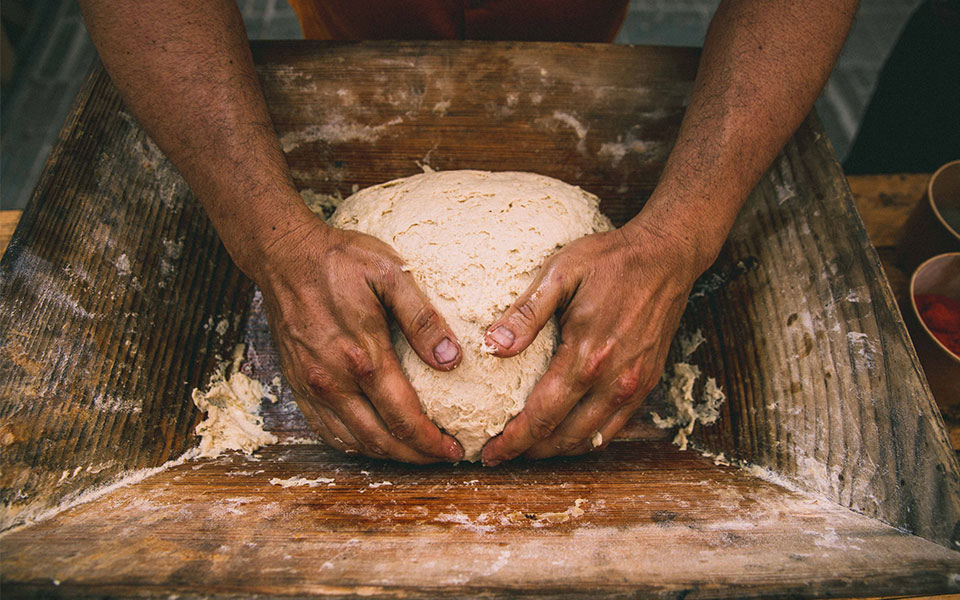
© Theo McInnes
Thanasis Tassos is head chef at Thamon and invites us to sample his modern, high-end twist on traditional Epirus gastronomy. Like Nomad et Sauvage, Thamon is drawing inspiration from the local ingredients and culinary heritage of Epirus to create something new but presenting it in a restaurant setting, rather than on the street.
“I grew up on a farm and hunting lodge, surrounded by the smell of our incredible local Epirus produce,” Thanasis explains. “But the most important influences for me have been the women who cook in my family and in the villages of Epirus. Even during the most difficult times, such as during the German occupation, they produced the most impressive dishes they could. They used the little ingredients they had, whatever the men could forage, hunt or fish: herbs, wild birds eels or wild boars.”
Thanasis developed his culinary skills in prestigious kitchens in Greece and Germany. He felt the call to return to Ioannina to make something world-class from the local ingredients and opened Thamon in April. He searches for small producers to source the finest local ingredients but presents them in unexpected ways. For example, trahana is usually served like a soup. At Thamon, sour trahana is used like a risotto, whose acidity brings out the smokiness of the eel, taken from lake Pamvotis nearby and slowly smoked on site.
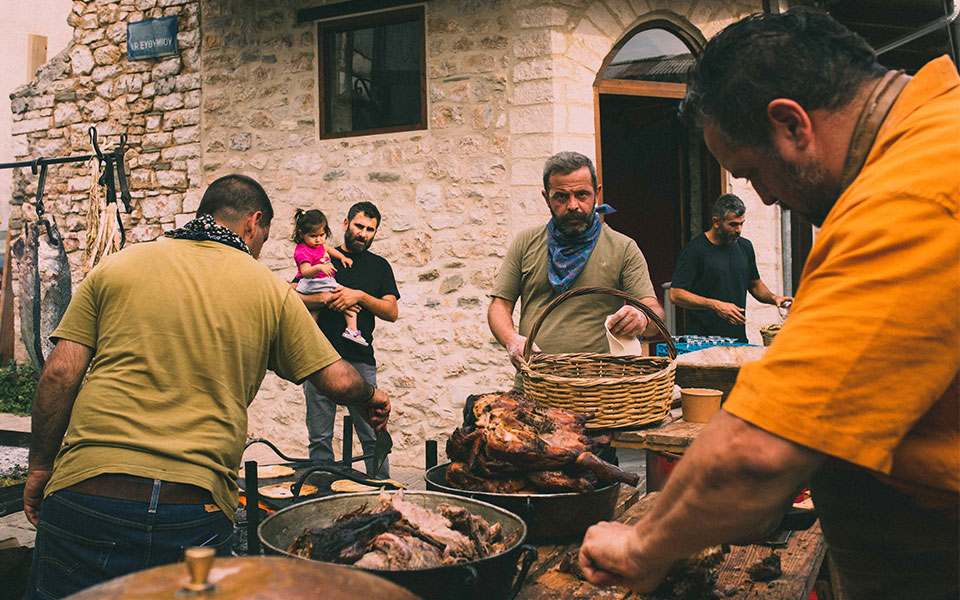
© Theo McInnes
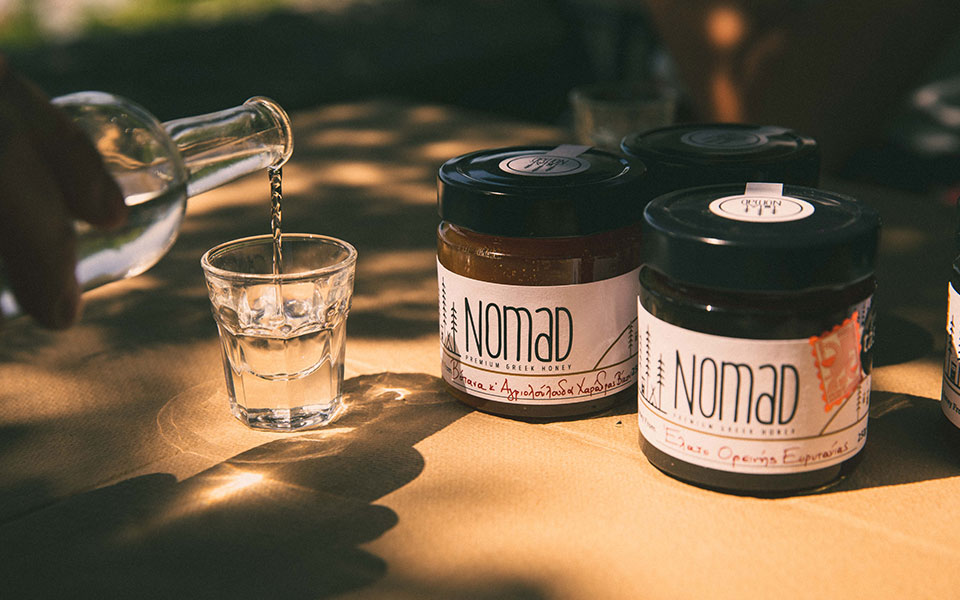
© Theo McInnes
“We are Epirotes and we’re proud of our identity and our homeland,” Thanasis says. “The new generation of chefs love our traditional recipes and ingredients. But we want to express ourselves and experiment with local produce. There was inertia here for many years but now I can see Epirus is taking off as a culinary destination.”
Two hours of cycling from Ioannina and after 600 metres of climbing we sweep majestically down into the central Zagori plain, which is in full bloom as spring turns slowly into summer. Lena Gerothanassi and her husband Kostas’ farm is outside Ano Pedina. Bathed in the afternoon light, the farm is idyllic: with a large barn for their 300 sheep during the winter, a dairy for milking sheep and cows, and an extensive vegetable garden.
Farming costs have risen steadily while agricultural prices declined until raising sheep alone wasn’t economically sustainable anymore. This is an issue that affects small farmers across Greece, particularly shepherds, and their numbers have steadily been falling. Seven years ago, Lena and Kostas rented the Rokka guesthouse in Elafotopos and now combine farming with tourism. Instead of selling wholesale or to the local market, serving the vegetables they grow and the cheeses they produce each day direct to their guests. This means they get the best price, losing none of the profit to middlemen, while guests get a farm-to-table experience and the food they enjoy is bursting with flavour and freshness.
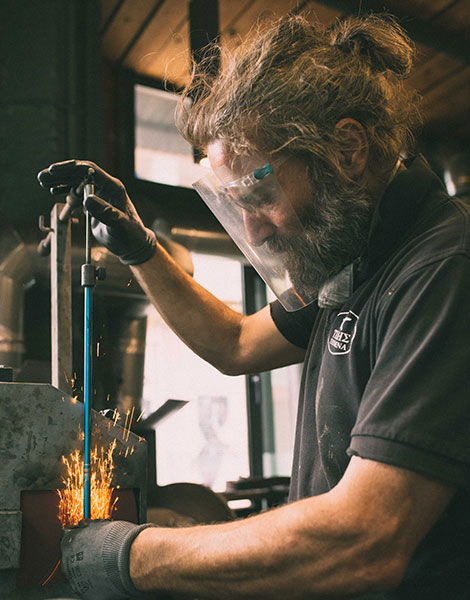
© Theo McInnes
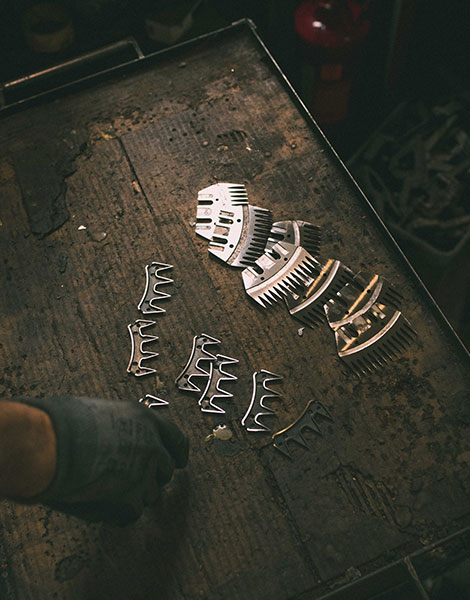
© Theo McInnes
Raised in Platamonas in central Greece, Lena’s passion is weaving. It brought her to Zagori 21 years ago to learn weaving at the housekeeping school in Ano Pedina. Today, Lena is worried by the slow disappearance of Epirus’ wool producers, despite traditional weaving enjoying a resurgence in popularity. During lockdown, she brought together a group including Ioannis Dekolis, the president of the Nomadic Shepherd’s Association of Epirus, and founded the Pokari Project as a Sustainable Social Cooperative Enterprise (KOINSEP).
Pokari aims to save the area’s nomadic shepherds and their ancient, indigenous breeds from extinction. The cooperative produces woven products, such as flokati carpets, sells wool for others to weave and organises educational initiatives for adults and children. “We want to give wool back its value, so we buy from farmers at a fair price,” Lena explains. “It’s also about giving wool its identity back, too, and restoring pride to the shepherds. We need to support nomadic farmers who are responsible for maintaining biodiversity on the mountains.”
Lena estimates that less than 10% of the houses in Elafotopos have people living in them all year round. In the harsh winters, the population shrinks to just 12 people. The houses are empty but not abandoned, they have owners, usually split between multiple members of the family living in the cities or even other countries. Lena argues there is plenty of demand for labour but the near impossibility of finding rental accommodation for workers, especially young families, makes it difficult to attract people to the area.

© Theo McInnes
“I would love to see these mountains full of young people one day,” Lena reflects. “There is work for everyone in farming, craft and tourism but if you combine these together, you get the maximum benefit. There are so many solutions for the problems we have, none of them are too difficult. There has to be a movement for change but if we don’t get there soon, it will be too late for Zagori.”
Campaigners thought they had successfully defeated hydrocarbon extraction plans in Epirus. But following the oil price shock provoked by Russia’s invasion of Ukraine, in April Greek Prime Minister Kyriakos Mitsotakis announced his government’s intention to continue exploration and potentially extraction in six on-and-off-shore areas in Greece – one in Epirus. Campaigners have struggled to get information out of Energean, the company active in the area, but it’s believed their interest is focussed on natural gas reserves near the village of Zitsa.
Zitsa is one of the biggest and most vibrant villages in the area, home to two respected wineries and it has its own PDO. Dimitris Ibrahim of Greenpeace Greece argues that the project should be halted on environmental and climate change grounds alone but questions whether the economics of natural gas extraction can stand up to scrutiny when costly pipeline infrastructure is taken into account. Local campaigners argue that any profits will not compensate for the drilling or even fracking’s destructive effects on the local economy, which is based primarily on tourism and small-scale agricultural production.
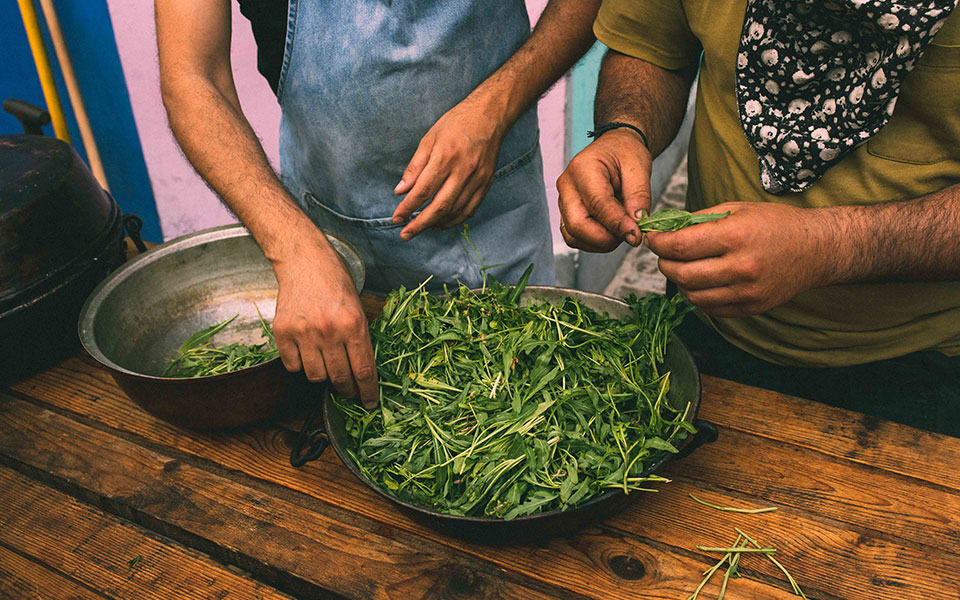
© Theo McInnes
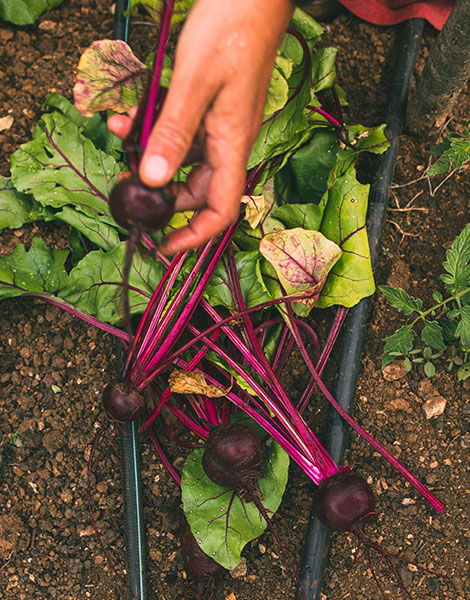
© Theo McInnes
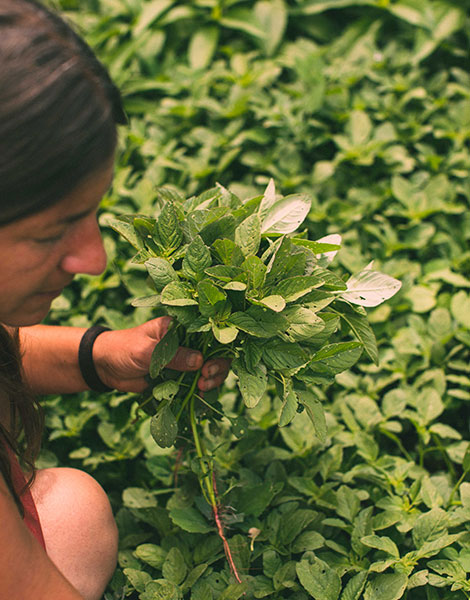
© Theo McInnes
After nightfall, music is echoing around the valley in central Zagori. The source of the ruckus is a ‘mushrock’ band playing their own mycelium twists on pop, rock and Greek folk classics. The annual mushroom festival is hosted in the grounds of the old weaving school, which is now a residential centre owned by the University of Ioannina. Seated at one of the tables heaving with food and drink, we find Vasilis Nakkas, a founding member of the Mushroom Club of Greece and a member of The High Mountains Social Cooperative.
Vasilis arrived in Ioannina aged 16, after growing up in Athens, Thessaloniki and Brussels. He was a hiking and rafting guide, while he worked to turn his hobby into a living: selling products from the mushrooms and wild fruits he forages in the countryside. “I also register and record new and existing species of mushrooms to demonstrate the huge biodiversity our area has,” he explains.
We cycle to meet Vasilis at a crossroads on the road to Kipoi. He leads us onto a ridge-line shaded by tall trees that has ideal conditions for mushroom collecting. “Mushrooms, wild herbs and wild fruits are an unexploited source of wealth in Epirus,” Vassilis explains, yet the valuable wild herbs that grow in Greek-Albanian border region cannot legally collect and processed in Greece, so are mainly collected by Albanians and sold worldwide. “There’s growing demand from tourists to learn about mushroom and truffle hunting, seasonal food and the health and medicinal benefits of wild herbs. But because we can’t do this in a legally regulated way, we’re losing out on all this income, the environment isn’t being protected and empty villages with ageing populations are the result.”
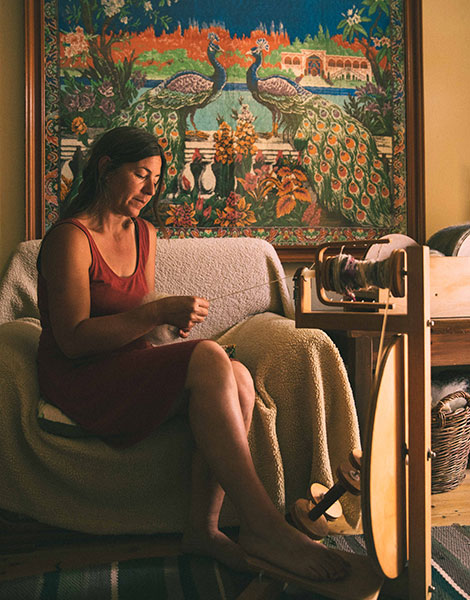
© Theo McInnes

© Theo McInnes
Vasilis is also a member of The High Mountains Social Cooperative, where he works with founder Sotiris Tsoukarelis to develop mountainous areas, build resilient networks, develop social tools, conduct research and support social economy businesses. The cooperative is made up of people who live, work and produce in mountainous areas and since 2015 it has been exploring community-based solutions to the extensive variety of challenges that make rural life almost impossible today.
Sotiris is also part of Tzoumakers, a makerspace in Tzoumerka which produces small-scale, open-source agricultural tools. In June he represented Tzoumakers at the European Commission’s Rural Pact Conference in Brussels. The EU is developing a new comprehensive package of economic reorganisation, technological development, energy transition and social support for rural areas to reverse rural decline across the continent. Sotiris contributed his experiences and research from Epirus.
“The EU funds social economy and research projects but rural life in Greece is still next to impossible,” Sotiris explains. “During the Byzantine and Ottoman eras, this area flourished because strong communities knew how to communicate and cooperate. We have to rediscover this collaborative mindset and utilise new technologies to enable communities to solve problems for themselves.”
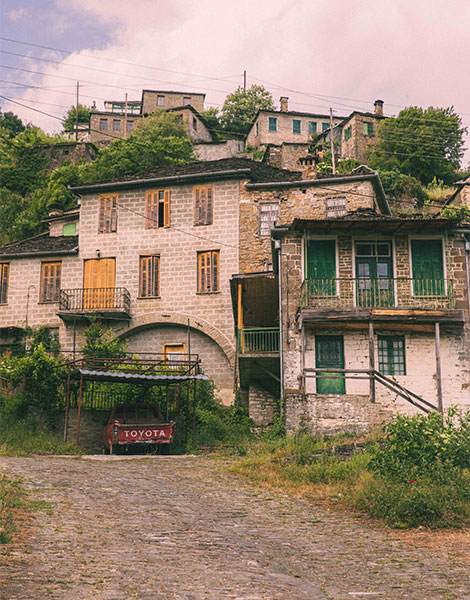
© Theo McInnes
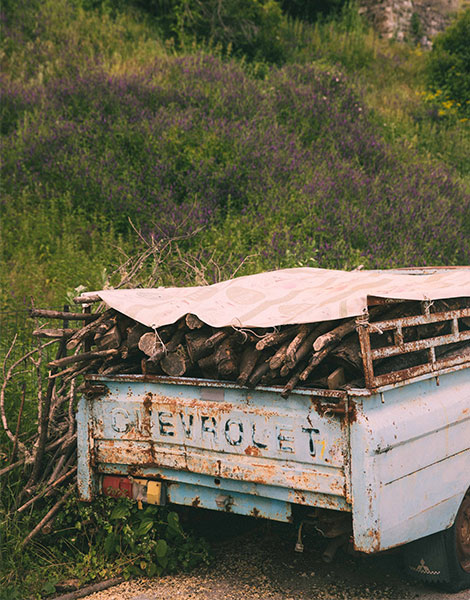
© Theo McInnes
“There’s no large-scale example of success, that’s why we’re working so hard to create a viable, bottom-up model for the rest of Europe,” Vasilis adds, with a broad smile stretching across his face. “There’s so much potential and demand for mountain produce, from ordinary city dwellers all the way up to high-end restaurants. This is just the beginning, so it’s incredibly difficult. We have to find the right pioneers… and we hope that’s us!”
In order to attract more tourists to Epirus, Ioannina International Airport was recently expanded. But while the region suffers from poor connectivity – there’s no railway, for example – there are more sustainable ways to arrive and explore. Choosing to cycle offered us some of the most spectacular mountain riding but that’s not an option for everyone. The Slow Cyclist offers electric bike tours for all ages and abilities. But perhaps most promisingly, outside the MountGrace Suites high up in Monodendri (near the Oxia Viewpoint for Vikos Gorge) we spotted an electric car charging point, charging an electric car that had come all the way from the Netherlands. Even in the most remote, mountainous corner of Greece, there are glimmers of a post-oil future. Drivers can easily arrive in Epirus’ port of Igoumenitsa from Italy and, with a relatively small investment, the electric car charging network could be expanded and made more accessible.
Greece is at a crossroads. Will it hand this spectacular country on to the next generation with its future secured or will it put the natural wealth of future generations at risk by drilling for oil and gas? Greece can be a leader in sustainable tourism, it has more advantages than most. Epirus has a particularly strong brand; with natural beauty, incredible produce, deep cultural traditions and that most precious of labels: unspoilt.
Epirus is old and it is deep. Aristotle wrote in Meteorologica that Epirus was the origin of the ancient Hellenic race – the pure Greeks. In one of the oldest, wildest and most underdeveloped regions of Greece, two distinct paths stretch out before us. We know where the road for oil tankers and the internal combustion engine leads, while the road that connects the rich traditions of the past with a sustainable and prosperous future leads us through the mountains of Epirus. These pioneers show us a sustainable path is possible.

